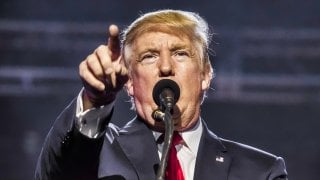Donald Trump's January 6 Nightmare Is Back
January 6 is back. It began when Donald Trump’s running mate, J.D. Vance, refused to acknowledge at the end of his debate with Tim Walz that Trump had lost in 2020. Now special counsel Jack Smith’s 165-page filing has put January 6 front and center.
January 6 is back. It began when Donald Trump’s running mate, J.D. Vance, refused to acknowledge at the end of his debate with Tim Walz that Trump had lost in 2020.
Now, special counsel Jack Smith’s 165-page filing has put January 6 front and center. In fighting to delay his trial in district court in Washington, DC, before Judge Tanya Chutkan, Trump inadvertently ensured that the issue of his conduct that day would erupt only weeks before the November 5 election. Already Kamala Harris is moving to denounce him while Trump is depicting himself as a victim of a Biden administration cabal intent on using “lawfare” to upend his election campaign.
Harris stated that yesterday that ““Anyone who has called for, I quote, the termination of the Constitution of the United States, as Donald Trump has, must never again stand, never again stand behind the seal of the president of the United States.” She has enlisted a bevy of conservative Republicans and former Trump administration officials to make the case for her that Trump represents a clear and present danger to the American Constitution.
Speaking at the birthplace of the Republican party-- Ripon, Wisconsin--at a Harris rally was none other than former Wyoming Rep. Liz Cheney. Both Cheney and her father, Dick, have vowed to vote for Harris. Cheney declared at the rally, “The most conservative of conservative values is fidelity to our Constitution. As we meet here today, our republic faces a threat unlike any we have faced before.” She went on to state that “in this election, putting patriotism ahead of partisanship is not an aspiration – it is our duty.” CNN reports that next week, Cheney and former Trump White House aides Alyssa Farah Griffin, Cassidy Hutchinson, and Sarah Matthews will appear on behalf of Harris in Montgomery, Pennsylvania, at a fireside chat.
The evidence that Smith compiled in his filing is damning. When told that Vice President Mike Pence had been moved to a secure location, Trump was indifferent. “So what?,” he apparently replied. This response should hardly come as a surprise. It is fully consonant with Trump’s insouciance about anyone other than himself. Smith further shows that Trump was repeatedly warned that his claims of election fraud were a taradiddle. Once again, he was unmoved. The veracity of his claims was not what interested him. It was their political efficacy.
Trump is battling to turn the tables on Harris. But the reemergence of January 6 is unlikely to redound to his benefit. Trump’s strategy had been to focus on the economy, immigration, and upheaval abroad. His advisers know that the more that Trump is the topic of debate, the worse his political prospects look for November. Now Trump’s strongman impulses—his loose talk about overturning the Constitution, his threats of retribution toward political opponents, and his fealty to foreign dictators such as Russian president Vladimir Putin—are dominating the presidential race. His bogus claim at a Michigan rally in 2020, “We won, we won, we did win. It was a rigged election, it was a rigged election,” may rouse the already converted. Still, they serve primarily as a reminder to swing voters of the perpetual chaos that accompanies him.

Add in that the economic good news keeps rolling in—the U.S. economy added 254,000 jobs last month, inflation has receded, the Federal Reserve is lowering interest rates, and the port strike has ended—and you have a distinct possibility for an uptick in support for Harris.
For now, Trump has been knocked off course. Harris remains on it.
About the Author
Jacob Heilbrunn is editor of The National Interest and is a nonresident senior fellow at the Atlantic Council’s Eurasia Center. He has written on both foreign and domestic issues for numerous publications, including The New York Times, The Washington Post, The Wall Street Journal, Financial Times, Foreign Affairs, Reuters, Washington Monthly, and The Weekly Standard. He has also written for German publications such as Cicero, Frankfurter Allgemeine Zeitung, and Der Tagesspiegel. In 2008, his book They Knew They Were Right: the Rise of the Neocons was published by Doubleday. It was named one of the one hundred notable books of the year by The New York Times. He is the author of America Last: The Right’s Century-Long Romance with Foreign Dictators.
Image: Shutterstock.com.


